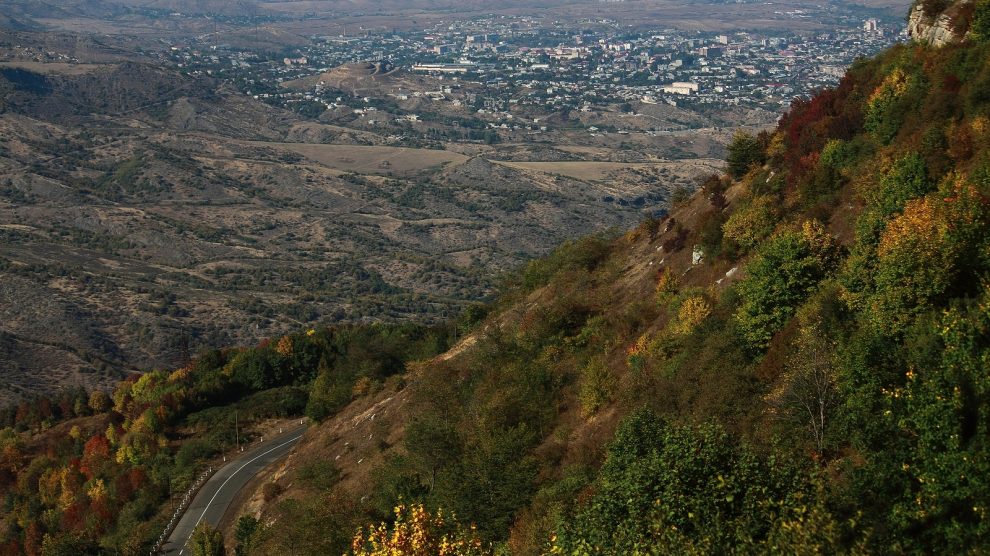Russia is manipulating the conflict between Armenia and Azerbaijan to further its interests.
Protestors were gathered on the mountain pass in freezing conditions. “We are here to stop the pillaging of our land and allow our inspectors access to our mines,” – one told me.
The protestor (his name withheld for security reasons) is an Azerbaijani environmental activist. The land in question, Nagorno-Karabakh, is internationally recognised as Baku’s sovereign territory, but has been held by ethnic Armenian separatists backed by Yerevan since the 1990s.
To add to the confusion, since November 2020, Russian peacekeepers have guarded the occupied territory. Though the mountain road remains open to humanitarian conveys and essential supplies, it is the only connection between mainland Armenia and the occupied territory.
- In Nagorno-Karabakh, Russian peacekeepers are failing to fulfil obligations
- Explainer: Azerbaijan, Iran and the crisis in the South Caucasus
- Stalemate in Nagorno-Karabakh
It has never been uncomplicated in the South Caucasus, a region wedged between Russia, Turkey, and Iran. The new tensions ignited by the protests sit upon the shoulders of a tortuous history. In the 1990s, as Azerbaijan and Armenia broke free from the Soviet Union, they fought a bloody war with one another over Nagorno-Karabakh.
A 1994 ceasefire left Armenians in control of the district and seven surrounding provinces, having emptied the region of roughly 600,000 Azerbaijanis. But in 2020, the countries were at war once again. Azerbaijan reclaimed a portion of its land before another Moscow brokered ceasefire put an end to 44 days of fighting. The agreement also delivered the Russian boots on the ground that now patrol the protectorate.
Moscow’s influence
Intrigue has surrounded the protestors since they arrived. Armenia and the separatists claim Baku sent them to force the Armenian population to leave and force a peace settlement. Meanwhile, the Azerbaijani government has made it clear they at least back the protestors, who claim the road is being used to transport loot and weapons to aid the independence struggle. However, which account you believe is immaterial to the most pressing question: how to end the blockade and restore the peace process between the two nations.
The answer lies in another enigma: the appearance of a new leader in Nagorno-Karabakh just three weeks before the sit-in began. A former adviser to President Vladimir Putin, Ruben Vardanyan has elicited suspicion from all sides of the conflict, as well as within Western diplomatic circles who have played a more active mediating role in the conflict at Europe’s fringes. The Azerbaijani Foreign Ministry has described Vardanyan as a foreign element and demanded he leave. Many allies of Armenian Prime Minister Nikol Pashinyan have also criticised the leader, saying his exit is necessary for lifting the blockade.
Born in Yerevan, the billionaire businessman made his fortune in Russia. The Organized Crime and Corruption Reporting Project (OCCRP) and the Navalny’s Anti-Corruption Foundation has alleged Vardanyan’s wealth is intimately tied to the criminal oligarchic system run by Vladimir Putin. Ukraine has sanctioned him for logistical support to Russia’s war in Ukraine.
An adviser to President Volodymyr Zelensky has even accused Vardanyan of inflaming the Lachin imbroglio to “distract attention from the war in Ukraine”. Many residents within Nagorno Karabakh have blamed Russian peacekeepers for not keeping the road open. Vardanyan has been notably mute on the subject.
Some commentators have claimed that his failure to reopen the Lachin pass wouldn’t be feasible if he was a Kremlin project. But this is back to front. The protests are because of him, and that suits Moscow: they prefer the conflict unresolved because it maintains leverage in what they consider their backyard. A peace treaty means Russian peacekeepers go home.

Stalemate, not peace
The timing and circumstances of Vardanyan’s elevation is telling. He became de facto prime minister of the de facto government a matter of weeks after Putin approved his renunciation of Russian citizenship.
The transition happened without any democratic process and he sacked the cabinet upon his arrival – all without a local power base given his lack of links to the province. Conveniently, Vardanyan’s rise came as an EU-US joint mediation process was bearing fruit. Last year, Armenia had agreed to recognise Baku’s sovereignty over Nagorno-Karabakh – previously the greatest obstacle to a durable resolution to the 30-year dispute.
Negotiations were already under way to delimit and demarcate the borders between the countries. All the while, Armenia had been distancing itself from Russia, its traditional economic and security ally. Against these currents, Russia had suggested the status of Nagorno Karabakh should be left of the table – a red line for those sitting it Baku – and has been highly critical of Western mediation in the region. With Vardanyan’s arrival, the peace process was kiboshed.
His mission is not peace but stalemate. After all, Vardanyan has a simple route to ending the row on the Lachin corridor. The protestors have demanded access to it so that inspectors may assess the mines they allege Vardanyan is pillaging. If, as many have claimed, Nagorno-Karabakh is suffering a humanitarian crisis (though Vardanyan himself avoids the language), granting permission to a select group of accredited professionals would seem a minor concession. If, that is, the safety and health of its citizens was Vardanyan’s first concern.
Russia is manipulating the conflict between Armenia and Azerbaijan to further its interests. Vardanyan is their key to impeding the Western mediation. His exit is the only means of reopening the road and restoring the peace process.
Unlike many news and information platforms, Emerging Europe is free to read, and always will be. There is no paywall here. We are independent, not affiliated with nor representing any political party or business organisation. We want the very best for emerging Europe, nothing more, nothing less. Your support will help us continue to spread the word about this amazing region.
You can contribute here. Thank you.


